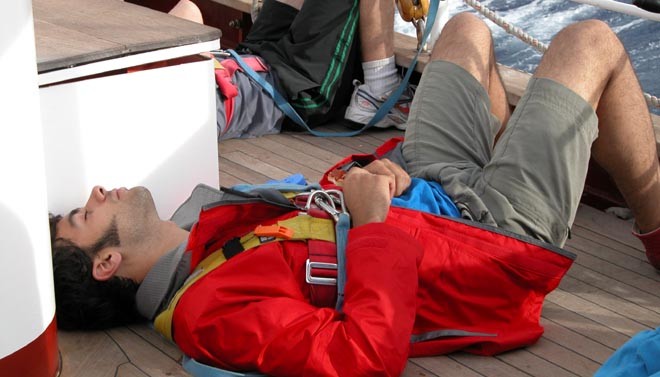When ALL the crew becomes seriously seasick...
by thisisthewestcountry/Sail-World Cruising on 15 Apr 2012

Seasickness - the scourge of many a top leisure sailor SW
Before undertaking any serious voyage, it is worthwhile checking that at least one person on your yacht is never subject to seasickness, as was demonstrated again with a rescue this week which proved harrowing for all involved. We all know individuals who are NEVER seasick, and they can be like-gold when conditions defeat other crew members. Read the story.
British lifeboat crews this week rescued three sailors suffering from severe seasickness during an exhausting eight-hour rescue mission in the Bristol Channel of the Somerset coastline.
The drama began at 11am on Easter Saturday when the crew of a yacht radioed for help after their vessel’s engine failed off the coastline. Now the engine failing on a sailing boat is not meant to be catastrophic, and certainly doesn't warrant the calling for rescue. But when the entire crew is seriously, debilitatingly seasick, the situation changes radically.
The rescue boat from Minehead battled rough seas and gusty winds to reach the vessel and brought one man and a woman to safety. It left an engineer on board with the yacht’s mechanic, also seasick, in an attempt to fix the engine.
However, after the crew had returned to base, the engineer made contact to say the mechanic’s condition had worsened. RNLI helmsman Paul Arnold said: 'We’d left one of the lifeboat crew on the yacht to help the mechanic but as he became quite worried about his deteriorating state, he radioed for assistance.
'Sea conditions were unpleasant and I think the rolling around and the smell of diesel proved too much for him.'
So the lifeboat had to return to the stricken vessel once again at around 12.30pm. The yacht was then towed to a safe anchorage point near Minehead with lifeboat crew on board.
Finally, after the tide turned, the 34ft yacht was towed back up the coast to Watchet Marina, eight hours after the distress call. All three crew members, who had been sailing from Weston to Watchet, suffered no long-term effects of the ordeal, as is usual with seasickness.
RNLI spokesman Chris Rundle (pictured) praised the mechanic’s bravery in trying to stay on board, but said it had been a tough ordeal. He said: 'We get about two or three incidents of severe seasickness a year.
The boat would have been rolling over deep troughs while roving the Bristol Channel, so it’s no surprise he felt quite seriously ill. The problem with seasickness is there is no respite. We had to wait four or five hours to rescue the yacht at high tide.'
Some of the world's greatest sailors have known to suffer from debilitating seasickness, but having all crew severely seasick at the same time is certainly a recipe for potential disaster.
If you want to link to this article then please use this URL: www.sail-world.com/96094